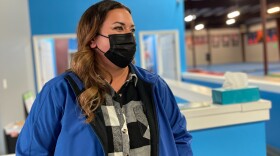After four days away from Ascension Seton Medical Center, nurses said they returned this past weekend to reports of substandard patient care — wound dressings left unchanged, lab work neglected and discharges delayed.
Kris Fuentes, a nurse in the hospital’s neonatal intensive care unit, was among a group of more than 600 nurses who participated in a one-day strike on June 27. She and her colleagues hoped the strike would put pressure on Ascension Seton’s negotiations with the nurses' union as it pushed for guaranteed staffing ratios, among other provisions.
The hospital threw a wrench in the striking nurses’ plans when it barred them from returning to work for an additional three days in order to fulfill a contract with temporary staff who covered shifts during the strike. Nurses from the union objected, criticizing Ascension for using its financial resources to pay for travel nurses rather than meet the union’s demand to hire more full time staff. They also warned that the hospital’s decision would have negative outcomes on patient care.
Fuentes said those concerns proved to be founded, with both patients and nurses who worked through the strike reporting a range of issues.
“We have a network of nurses that I’ve checked in with for each unit, and each one has shared examples of sub-optimal care throughout the hospital,” Fuentes said.
In the critical care unit, Fuentes said some patients did not have wound dressings changed for four days, although they should have been refreshed daily. Patients in the ICU on medication IVs also never had routine lab work important to monitor their conditions, she said. One of the reports she found most alarming related to perinatal care.
“Patients reported that during the lockout their baby’s heart rate dropped, and the nurses didn't know what doctor to contact,” Fuentes said. “That's an urgent situation.”
Fuentes said these reports, while distressing, were unsurprising.
“Even the most skilled temporary RN can’t be dropped in a hospital unit and expected to replace the familiarity and specialized knowledge of a RN who has been there for years, because every unit has specific protocols and procedures,” she said. “Also, every unit has nurses with specific skills and experiences that build a team.”
Bolstering the nurses’ stance is a 2010 study from the National Bureau of Economic Research which followed New York hospitals where nurse strikes took place across two decades; the study found that patient mortality was 19.4% higher during a strike, and patient readmission was 6.5% higher.
Ascension, however, said the hospital was adequately staffed during the regular nurses’ four-day absence, and that patients received appropriate care.
“Approximately 30% of our represented associates chose to report to work and continued caring for our patients through the short-term strike event,” a hospital spokesperson said in a provided statement. “This support, along with the temporary staff we engaged, ensured we were able to continue to provide quality patient care across all disciplines — inpatient care, emergency care, diagnostics, outpatient procedures, surgeries and more. We were well prepared to support continued operations across our ministry.”
Nurses reported ongoing issues in the days following their return to work on July 1. Fuentes said staffing was even lighter than usual in the NICU — five to six nurses short — and that she and other nurses in the unit have received repeated requests to work extra and longer shifts. A nurse manager in the labor and delivery unit, Fuentes said, had to handle multiple patients herself, and called Safe Harbor, a tool Texas nurses can use to protect their license when they feel an assignment given to them may result in a violation of Texas Board of Nursing rules.
“Our staff was told whether they were scheduled to work or not, they had to show up on Tuesday [June 27],” she said. “They intimidated some staff into coming in, and that left for short shifts after we came back.”
Union representatives have already met with hospital management since the strike, and more sessions are set for the future. According to Matthew Clark, an ICU nurse and a member of the union’s bargaining team, more work lies ahead before the two entities can come to an agreement.
“While this was by far the most productive bargaining session that we've had to date with our administration, it didn't go near far enough to settle the contract by any means,” Clark said.
Correction: A previous version of this story incorrectly identified an incident about response to a baby's dropping heart rate as occurring in the NICU. The report was about another unit.









